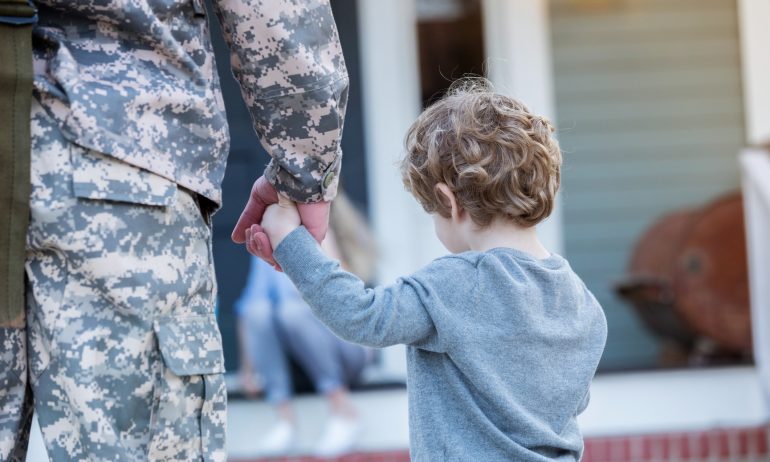What Are VA Loan Closing Costs?

Some or all of the mortgage lenders featured on our site are advertising partners of NerdWallet, but this does not influence our evaluations, lender star ratings or the order in which lenders are listed on the page. Our opinions are our own. Here is a list of our partners.
A VA mortgage offers a tantalizing benefit for current and veteran military members: No down payment is required.
But you'll still owe closing costs to finalize a home loan backed by the U.S. Department of Veterans Affairs.
Don't let these final costs scare you off from buying a home — or catch you off guard.
How much are VA loan closing costs?
Closing costs include the various fees required to settle a home loan. Generally, closing costs range from about 2% to 6% of the loan amount.
Like other mortgages, VA loan closing costs include such fees as:
An appraisal fee. For a VA loan, the appraisal estimates the home's value and determines whether the property meets the VA's minimum standards. The VA limits how much appraisers can charge.
Discount points, which are optional fees you can pay to lower the interest rate.
Government recording fees to update local property ownership records.
Loan origination charges for underwriting and processing the loan.
Local and state taxes.
Prepaid expenses, such as home insurance and property tax.
Title-related costs, which may include title insurance, title search fee and others.
VA funding fee
VA loans don't include mortgage insurance. But they do include a special charge called the VA funding fee. The fee helps cover the VA's costs for guaranteeing loans. If a borrower defaults on a loan, the VA repays the lender a portion of the outstanding balance. The guarantee allows lenders to offer VA loans at competitive rates without requiring a down payment.
For purchase loans, the VA funding fee depends on the size of your down payment and whether this is your first or a subsequent VA mortgage.
The fee for a first purchase or construction loan is 2.15% of the loan amount with a down payment of less than 5%; it's 1.5% with a down payment of 5% up to 10%; and 1.25% with a down payment of 10% or more.
Funding fee for a first purchase or construction loan
Down payment | Funding fee |
|---|---|
Less than 5% | 2.15%. |
5%-9.9% | 1.5%. |
10% or more | 1.25%. |
The VA funding fee for a subsequent purchase or construction loan is 3.3% of the loan amount with a down payment of less than 5%; it's 1.5% with a down payment of 5% up to 10%; and 1.25% with a down payment of 10% or more.
Funding fee for a subsequent purchase or construction loan
Down payment | Funding fee |
|---|---|
Less than 5% | 3.3%. |
5%-9.9% | 1.5%. |
10% or more | 1.25%. |
Refinancing? The VA funding fee for a VA cash-out refinance is 2.15% for a first loan and 3.3% for a subsequent loan. The fee for an Interest Rate Reduction Refinance Loan, or IRRRL (pronounced “Earl”), is 0.5% for a first or subsequent loan.
Funding fee for VA refinance loans
Loan type | Down payment |
|---|---|
Cash-out refinance, first use | 2.15%. |
Cash-out refinance, subsequent use | 3.3%. |
Interest Rate Reduction Refinancing Loan, or IRRRL | 0.5%. |
Some borrowers are exempt from the VA funding fee, including:
Veterans who are eligible for compensation for service-connected disabilities.
Service members on active duty who have received a Purple Heart.
Surviving spouses who are receiving dependency and indemnity compensation.
Closing cost limits
The VA prohibits and limits some fees for borrowers.
Attorney fees: Lenders can't make you pay attorney fees, except for title work, although you can hire and pay for a real estate attorney on your own.
Loan origination charges: Lenders cannot charge more than 1% of the loan amount for purchase mortgages. For construction loans, lenders can charge up to an additional 2% of the loan amount; the allowed amount depends on how much the lender advances to the veteran or supervises the project.
Seller-paid fees: Sellers must pay these fees when you buy a house:
Real estate agent commissions and brokerage fees.
Buyer broker fee.
Termite report fee.
How to limit out-of-pocket VA loan closing costs
Here are some ways to lower your upfront closing costs.
Ask the seller to pay some of your closing costs. The VA limits the amount the seller can pay to no more than 4% of the loan amount. However, note that sellers may not be willing to pay in a competitive real estate market. Work with your real estate agent to decide how to negotiate.
Get help through a closing costs assistance program. Many states offer programs for first-time home buyers, including zero-interest loans and grants to cover closing costs.
Roll the VA funding fee into the loan. This will cut your upfront out-of-pocket costs, but it will increase your monthly mortgage payment.



